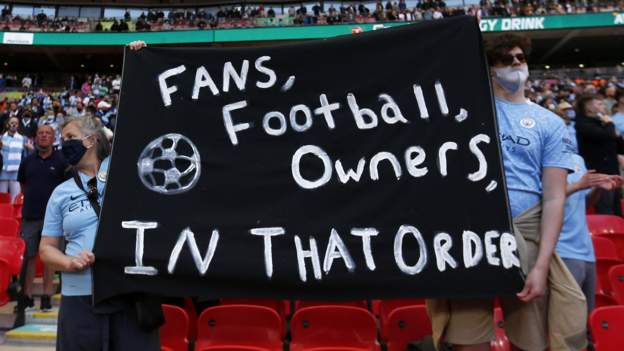“Without fans who pay at the turnstile, football is nothing”. Similar quotes to that of the Celtic and Scotland legend Jock Stein appeared across banners during the pandemic when the turnstiles fell silent for 18 months, and the stands stood empty, even when play restarted in Summer 2020.
A year into the pandemic, the European Super League (ESL) was introduced by twelve of
Europe’s ‘leading’ clubs- six of which came from England. As both sides upped the rhetoric in the first two days, fans were left wondering if the national game in England was about to
radically change forever.
Very few people thought these changes were good, and the majority protested against them. After two days, the league plan was shelved after all but three of the clubs left the plan, but to many, the reputational damage was done. In response to this and other events in the previous two years, the UK government set up the ‘fan-led review’ into football governance to investigate how best to respond to this growing issue.
Bad governance has always existed in football, for example, George Reynolds’ disastrous reign at Darlington which ultimately led them to ruin in the 2000s but as the game has grown financially at all levels it has become more susceptible to malicious takeovers.
The fan-led review’s recommendations have been taken forward into a football white paper,
published in February 2023, and outlined the plan for an independent football regulator, outside the control of the FA. It would serve three main purposes: the financial stability of clubs, the wider financial stability of the pyramid, and protecting the heritage of football clubs.
At first, regulation can seem a scary proposition, or the encroachment of government onto the field of play. But something has to change, and English football can not continue down the same path it currently heads.
The regulator does not aim to eliminate the risk of failure, but rather to reduce it in the long term as much as possible in order to preserve clubs, who are often the
heart of the community, particularly in towns which have suffered the worst effects of deprivation and the decline of industry.
This would be done through a licensing system, aimed at four pillars of a sustainable club
management, including only competing in approved competitions stopping any future breakaway attempts such as the European Super League, and maintaining fan input on key decisions for a club, such as moving from their home stadium.
For instance, this would likely prevent a repeat of the controversial decision that led to Wimbledon being moved to Milton Keynes in 2004.
Overall, the idea of an independent regulator that seeks to protect the interest of fans can be a genuine positive. Fans are at the core of the national game and it is vitally important that the risk of clubs disappearing off league tables forever, such as at Bury, Macclesfield and Darlington, is reduced as much as possible.





